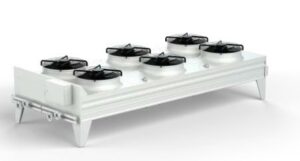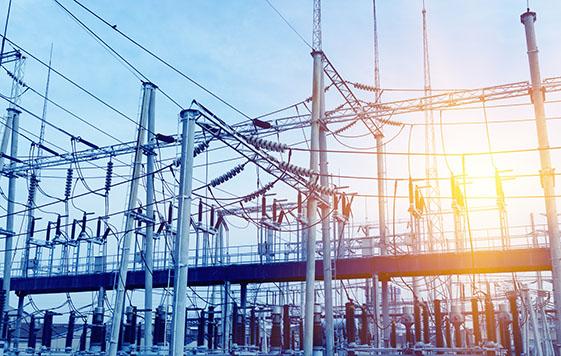Outdoor coolers are used when technical cooling water is not available and water to water heat exchanger cannot be used. There are many factors that influence on the outdoor cooler design. Especially the environmental conditions of the installation location need to be taken into consideration. In the most basic case, the sizing of the outdoor coolers is based on
- maximum outdoor temperature,
- maximum allowed coolant temperature
- specified cooling power and coolant flow of the customer power electronics cooling circuit.

The installation sites have additional factors that impact on the design and selection of dry cooler materials. Typical factors are air pollution, salty environments, snow and ice accumulation and noise requirements due to urban surroundings.
- Air pollutions and salty environment cause defects on the materials. To ensure long operational lifetime, typically required between 20 to 40 years, necessary corrosion protection measures need to be taken.
- Snow and ice accumulation could mean that the height of the dry coolers from the ground should be sufficient and the accumulation on top of the coolers should be considered.
- The noise requirements are often due to site close location to housing, offices, or other public areas where excess noise is not allowed.
AC vs EC fans
When designing outdoor coolers also a selection between AC and EC fans may be made. An AC (Alternating Current) fan is supplied with AC voltage and it is running at constant nominal speed. This means that the fan is running with nominal speed (ON) or not at all (OFF). An EC (Electronically Commutated) fan is supplied with AC voltage as well, but in addition to that the EC fan has a built-in controller. With an additional voltage signal the rotation speed of the fan can be controlled and adjusted when needed. But how do these two technologies influence the outdoor cooler design?
The advantages of the AC fans are the vast track record and the proven technology in the cooling applications. Additionally, the structure of the fan motor is simple, which results in lower manufacturing cost. The advantages of the EC fans are more accurate control of the cooling power, lower operational cost due to higher energy efficiency and lower fan noise emissions.
When the outdoor cooler is equipped with the AC fans the fans are switched ON and OFF individually based on the required need of the cooling power. With the EC fans all fans are running simultaneously and the controlling of the cooling power is made by increasing or decreasing the rotational speed of all fans. If low cooling power is needed, all AC fans are stopped whereas EC fans are constantly rotating at low rotational speed (typically between 10-20% of nominal rpm). While this generates some no-load losses with EC fans, it gives the advantage of reducing dust, ice or snow accumulation and thus preventing bearing failures.
AC-fans (Alternating Current)
+robust and simple structure
+often slightly lower product cost
-possibility of jamming due to ice or snow in case of long time between operations
-produces more noise
-higher operational losses
EC-fans (Electronically Commuted)
+more accurate control of cooling
+lower operational cost (typically up to -30%)
+lower noise emissions
+snow and ice accumulation not a big issue
+minimum low speed rotation protects bearings
-often slightly higher product cost
Which technology is the best? The answer is not obvious:
- If mainly the price of the equipment matters, and losses or noise is not that big issue then AC fans are good solution
- However, if you are looking at total cost of ownership and prefer lower noise level, then EC fans should be preferred.
Feel free to contact one of our cooling experts for other design aspects outdoor coolers and let’s find together the optimal system configuration for your cooling needs!
WORDS: Pauli Halonen, Sales Manager, Adwatec Oy
+358 50 410 8338
pauli.halonen@adwatec.com


